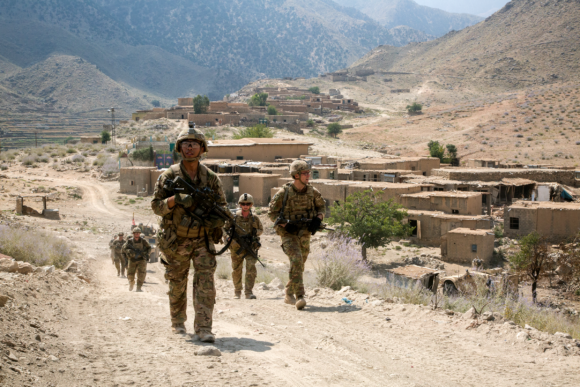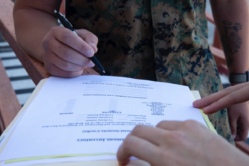Table of Contents
- Tax-Exempt Military Combat Pay
- Combat-Zone Compensation for Members of the Armed Forces
- Special Rules Regarding Tax-Exempt Combat Pay and Benefits
- Qualifying for Tax-Exempt Combat Pay: § 1.112-1 (b) Service in a Combat Zone
- Amount of Pay Excluded: § 1.112-1 (a) Combat-Zone Compensation Exclusion
- Hospitalization as a Result of Service in a Combat Zone: § 1.112-1 (a) Combat-Zone Compensation Exclusion and (c) Hospitalization
- Re-Enlistment Bonuses and Installment Payments: § 1.112-1 (b) Service in Combat Zone
- Combat Zones and Other Affected Areas: § 1.112-1 (e) Service in Area Outside Combat Zone
- Other Tax-Exempt Pay Related to Combat Zones
- Currently Recognized Combat Zones
- Verify Your Tax Status With Professionals
U.S. Armed Forces members who serve or served in combat zones can exclude portions of their pay from their taxable income.
You might also be eligible for additional time to make a qualified contribution to an IRA, and be able to file an extension to complete your taxes without paying penalties.
The IRS defines a combat zone as an area designated by the President through an executive order as an area in which the Armed Forces are engaging in or have engaged in combat.
Tax-Exempt Military Combat Pay
You do not report the following income sources against your gross income if they are earned in a qualified combat zone:
- Active-duty pay earned in any month served in a combat zone
- Imminent-danger pay and hostile-fire pay earned during a month served in a combat zone
- Re-enlistment bonus re-enlistment or voluntary extension occurs during a month served in a combat zone (annual installments will also be tax-free).
- Pay for accrued leave — the Department of Defense must determine the unused leave was earned during the month served in a combat zone
- Awards or achievement pay made for a suggestion or achievement made in a month served in a combat zone
- Student loan repayments for the portion of the year you were present in a combat zone
The background for these statements can be found in the Code of Federal Regulations (CFR), Title 26, Section 1.112-1.
Pay Exempt from Federal Income Taxes
Your branch of service should classify your service as tax-exempt, and the Defense Finance and Accounting Service will not withhold federal income taxes from your base pay. According to the IRS, “Military pay earned while in a combat zone is subject to Social Security and Medicare taxes and will appear on your W-2.”
Also, while most states exempt military pay from a tax-exempt zone, they are not required to do so. Check with your state tax agency for more information.
Combat-Zone Compensation for Members of the Armed Forces
Title 26 of the CFR, Section 1.112-1, covers combat-zone compensation for members of the Armed Forces. This page provides many examples of which types of military income are tax exempt and under which circumstances. It would be a very good idea to familiarize yourself with this page if you have a unique situation.
Special Rules Regarding Tax-Exempt Combat Pay and Benefits
Qualifying for Tax-Exempt Combat Pay: § 1.112-1 (b) Service in a Combat Zone
If you served in a combat zone for one or more days during a particular month, you’re allowed the above exclusions for that entire month. Combat-zone service includes any periods you are absent from duty due to illness, wounds, or leave. Service members are also considered to be serving in a combat zone if they become prisoners of war or are missing in action if that status is kept for military pay purposes.
Amount of Pay Excluded: § 1.112-1 (a) Combat-Zone Compensation Exclusion
Enlisted pay: The full amount of pay you receive while serving in a combat zone is tax exempt.Commissioned officer pay: Commissioned officer combat-pay exclusion (other than a commissioned warrant officer) is limited to the highest rate for enlisted pay (plus hostile fire and imminent danger pay, if any).
Hospitalization as a Result of Service in a Combat Zone: § 1.112-1 (a) Combat-Zone Compensation Exclusion and (c) Hospitalization
You can also exclude military pay earned while hospitalized as a result of wounds, disease, or injury incurred while serving in the combat zone. You don’t have to be hospitalized in the combat zone. This is true even if you’re hospitalized after combat-zone service.
There may be certain time limits and exclusions for this type of pay.
Re-Enlistment Bonuses and Installment Payments: § 1.112-1 (b) Service in Combat Zone
Re-enlistment bonuses for contracts signed in combat zones: If you sign a re-enlistment contract while serving in a tax-exempt combat zone, the entire re-enlistment bonus you earn will be tax exempt. This also extends to any annual installments that will be paid in the future, regardless of whether or not you are serving in a combat zone at the time the installment bonus is paid.
See U.S. Code – 26 CFR § 1.112-1 – Combat zone compensation of members of the Armed Forces, paragraph (b), Example 5 for more information.
Re-enlistment bonuses for contracts signed outside of combat zones: On the other hand, if you sign a re-enlistment contract outside of a combat zone, any re-enlistment bonuses you earn are not tax-free, even if the bonus installment is paid while serving in a combat zone.
See U.S. Code – 26 CFR § 1.112-1 – Combat zone compensation of members of the Armed Forces, paragraph (b), Example 6 for more information.
Combat Zones and Other Affected Areas: § 1.112-1 (e) Service in Area Outside Combat Zone
Military service outside a direct combat zone qualifies as service inside a combat zone for tax purposes if the service is in direct support of combat-zone military operations and the service qualifies you for special military pay for duty subject to hostile fire or imminent danger.
There may be certain exceptions to this, such as being in the area during leave, passing through during travel, or you are there for personal convenience.
Be sure to read Paragraph (f) “Nonqualifying presence in combat zone” for more information.
Also see Designated Direct Support Areas of a Combat Zone (CZ) for more info.
Other Tax-Exempt Pay Related to Combat Zones
Hazardous Duty Pay Is Tax Exempt
Members of the Armed Forces who serve outside a hazardous duty area while supporting operations in a hazardous duty area are eligible for a tax-filing extension. Meeting additional requirements may entitle you to full combat zone tax benefits.
Hostile Fire and Imminent Danger Pay (HFP/IDP)
You are entitled to imminent danger pay when you are assigned to a designated IDP area. Hostile fire and imminent danger pay is paid at a rate of $7.50 per day, up to a maximum of $225 per month. However, service members who are exposed to a hostile fire event or mine explosion are eligible to receive the full monthly amount.
The commander determines HFP based on whether a service member is one of the following:
- Subject to hostile fire or mine explosions
- In an area near hostile fire or mine explosions that endanger the member
- Killed, injured or wounded by hostile fire, mines or any hostile action
You cannot receive both IDP and HFP in the same month.
Currently Recognized Combat Zones
According to the IRS, the following areas are currently recognized as combat zones:
Sinai Peninsula
Under the Tax Cuts and Jobs Act (TCJA) enacted in December 2017, members of the Army, Navy, Marines, Air Force and Coast Guard who performed services in the Sinai Peninsula can now claim combat-zone tax benefits.
Afghanistan Area
By Executive Order No. 13239, Afghanistan (and the airspace above) was designated as a combat zone beginning Sept.19, 2001.
- Afghanistan
The following countries were certified by the DoD for combat zone benefits due to their direct support of military operations in the Afghanistan combat zone:
- Jordan, Kyrgyzstan, Pakistan, Tajikistan and Uzbekistan (as of Sept. 19, 2001)
- Philippines (from Jan. 9, 2002-Sept. 30, 2015)
- Djibouti (as of July 1, 2002)
- Yemen (as of April 10, 2002)
- Somalia and Syria (as of Jan. 1, 2004)
Note: For the Philippines only, the personnel must be deployed in conjunction with Operation Enduring Freedom supporting military operations in the Afghanistan combat zone.
Kosovo Area
By Executive Order No. 13119, the following locations (and the airspace above) were designated as a combat zone beginning March 24, 1999:
- The Federal Republic of Yugoslavia (Serbia/Montenegro)
- Albania
- Kosovo
- The Adriatic Sea
- The Lonian Sea — north of the 39th parallel
Note: The combat-zone designation for Montenegro and Kosovo (previously a province within Serbia) under Executive Order 13119 remains in force even though Montenegro and Kosovo became independent nations since EO 13119 was signed.
Arabian Peninsula Area
By Executive Order No. 12744, the following locations (and the airspace above them) were designated as a combat zone beginning Jan. 17, 1991:
- The Persian Gulf
- The Red Sea
- The Gulf of Oman
- The part of the Arabian Sea that is north of 10 degrees north latitude and west of 68 degrees east longitude
- The Gulf of Aden
- The total land areas of Iraq, Kuwait, Saudi Arabia, Oman Bahrain, Qatar and the United Arab Emirates
The following countries were certified by the Department of Defense for combat zone tax benefits due to their direct support of military operations in the Arabian Peninsula combat zone.
- Jordan (as of March 19, 2003)
- Lebanon (as of Feb. 12, 2015)
Verify Your Tax Status With Professionals
Be sure to check with your tax professional, base legal office or other qualified professional. These tips are only meant to serve as a guide, and are subject to change. Please check with a qualified professional before filing your taxes with the IRS.
See these related articles regarding military pay and taxes:




Comments:
About the comments on this site:
These responses are not provided or commissioned by the bank advertiser. Responses have not been reviewed, approved or otherwise endorsed by the bank advertiser. It is not the bank advertiser’s responsibility to ensure all posts and/or questions are answered.
R Daniels says
Potential Article? DFAS is currently trying to collect Social Security that were not collected in 2020 from National Guard and Reservist who still have not ‘repayed’ them in 2021-2022 via their drill pay. DFAS will be issuing W2C’s (Corrected Wages and Tax Statement) reflecting the unpaid amount as additional taxable income. This may require us to amend our tax return. They are ‘encouraging’ members to pay this as a lump sum to prevent receiving a W2C and having to ‘amend’ their taxes. Question? What year would be amend, 2020 or the year the W2C is issued for? Secondly, since most NG and Reserve Service Members in this situation were Deployed to zones that are not subject to Federal Tax (combat and hazardas duty zones) this ‘Amount’ would not be taxable anyway….
Nancy gatcomb says
Hi, we have paid for all expenses for our son who is a disabled Iraq Veteran. He was homeless lived with us for 2016 n before, paid for medical n scripts, day care n child support for his daughter. What forms are we to use, where do I find them. He didn’t recieve any money from VA till end ifv2016 but still lived with us paid no rent, etc. We r so broke I can’t make my rent I don’t know what to do.
Mike Kowalski says
I have a quick question. I’m currently serving in a Combat Zone, and I have a pending Board for Correction of Naval Records case to be heard. If I win my case and am awarded monitary compensation, will that amount be tax free if it’s awarded while I’m still in a tax free zone?
Thank You in advance for your prompt reply.
V/R
HM2(SW/SS) Kowalski
Ryan Guina says
Hi Mike, based on everything I have read, your military pay and compensation will be tax free if you receive it while in a tax free zone. That said, I am not 100% certain how your case would be processed. I recommend contacting your finance department for information specific to your situation. Thanks for your service.